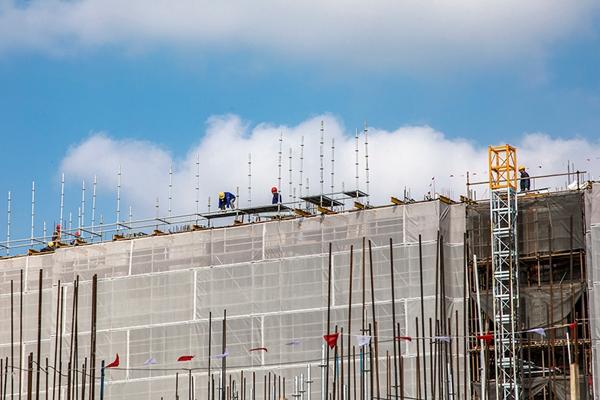Some bright sparks in Shanghai create hopes of property recovery
 0 Comment(s)
0 Comment(s) Print
Print E-mail China Daily, July 24, 2023
E-mail China Daily, July 24, 2023

Builders work at the construction site of a housing project in Shanghai. [Photo/China Daily]
While a broad recovery of the residential property sector is still awaited, Shanghai, one of the most-sought-after destinations of commercial property buyers on the Chinese mainland, has seen a steady recovery of its commercial property market, the latest data indicated.
Thanks to the Shanghai government's supportive policies, the retail sector saw effective recovery, which then rippled over the commercial property segment that houses retail stores.
During the fourth edition of the Double Five shopping festival, which was held in Shanghai from April 29 through the end of June, 7.13 billion yuan ($993.5 million) was spent daily on average at brick-and-mortar stores across the city, up more than 16 percent year-on-year, according to Consumer Market Big Data Laboratory (Shanghai).
In the first half of this year, 53,000 square meters of retail space was absorbed in the market. In the second quarter, the average rent of shopping malls' first floor stabilized at around 34 yuan per square meter per day, according to data compiled by CBRE, a commercial real estate services and investment firm.
Footfalls in the retail sector as well as actual consumption remained on a modest recovery trajectory. Tenants of commercial properties housing food and beverage businesses led the recovery, with commodity retail sales gaining some momentum.
"In addition to continued expansion by food and beverage tenants, the second quarter also saw fashion and lifestyle retailers regaining confidence," said Huang Zhen, head of retail agency leasing at JLL East China.
The city's logistics property sector saw a record supply of 787,000 sq m in the first half, with its net absorption hitting a seven-year high at 314,000 sq m, according to CBRE.
Sun Jie, head of industrial and logistics at CBRE China, said she believes the short-term large supply won't affect the long-term stable development of warehouse logistics.
"Shanghai's strong manufacturing and dynamic consumption industries' development will continuously drive active demand," said Sun.
In the office sector, 529,000 sq m of new supply became available in the first half, soaring nearly 265 percent year-on-year, and absorption declined about 32 percent year-on-year to 219,000 sq m, according to CBRE.
Owing to the large amount of new supply and existing stocks, office rents slid 1.1 percent from the end of last year to 272.6 yuan per sq m per month in the first half, it said.
Zhang Yue, head of office with advisory and transaction services for CBRE eastern China, said challenges and opportunities coexist as some 953,000 sq m of new office supply will come into the market in the second half, reaching a decade high.
"Shanghai's economic strengths will constantly create momentum for the city's medium- to long-term development. Factoring in the integrated effect of various policies, we expect market confidence to gradually improve, market dynamics to keep strengthening, and office demand to rise at an accelerated pace," said Zhang.
The first half of this year saw Shanghai's investment activity moderate with transaction volume reaching 36.5 billion yuan, down 13.5 percent year-on-year.
Transactions slowed in the second quarter compared with the first quarter. Among second-quarter transactions, office and multi-family assets accounted for 43 percent and 36 percent, respectively, followed by business parks (16 percent) and retail assets (5 percent).
"In terms of buyers, domestic funds remained the main driver of investments in the second quarter, while foreign investors maintained a more cautious attitude," said Sun Ling, head of JLL capital markets for East China.





